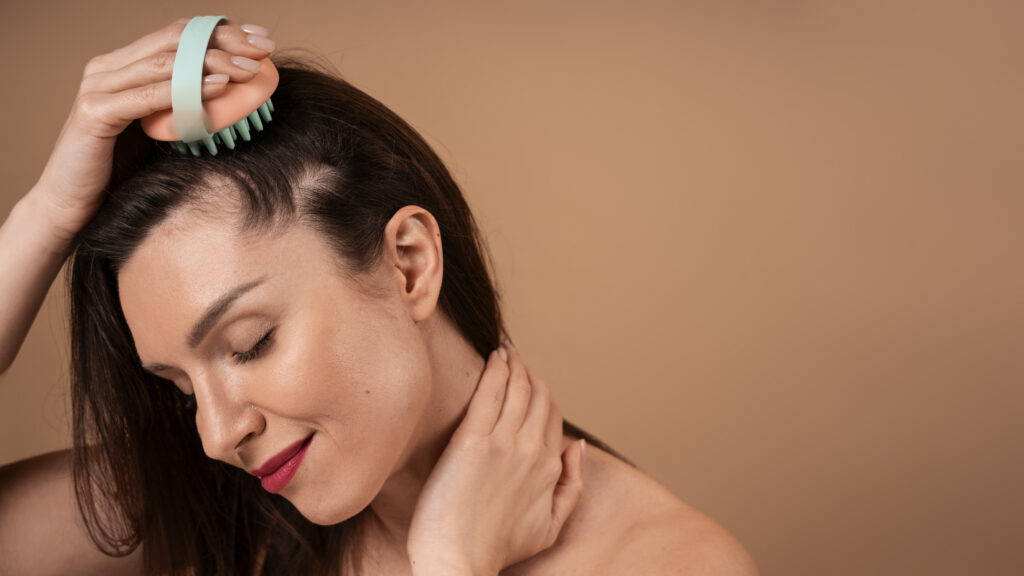Scalp Health Before Hair Transplant: Why Preparation Matters
Healthy scalp before hair transplant ensures lasting results. At Dr. Hanan Clinic, Chennai, treating scalp issues boosts graft survival and growth.”

Hair transplantation has become one of the most effective and permanent solutions for baldness and thinning hair. However, what many patients don’t realize is that the success of a hair transplant depends heavily on the condition of the scalp before surgery. Preparing your scalp is not just a recommendation—it is a crucial step that influences graft survival, healing, and long-term results.
At Dr. Hanan Dermatology Speciality and Trichology Clinic, Chennai, we emphasize scalp health as the foundation for natural, lasting hair transplant outcomes. In this blog, our dermatologists explain why scalp preparation is important, what steps patients should take, and how to maximize transplant success.
Why Is Scalp Health Important Before a Hair Transplant?
Your scalp is the “soil” where transplanted hair grafts will grow. If the scalp is unhealthy—due to dandruff, infections, poor circulation, or inflammation—the newly transplanted follicles may not survive. A well-prepared scalp ensures:
- Stronger Graft Survival: Healthy scalp tissue provides proper blood supply and nutrients.
- Faster Healing: A clean, hydrated scalp recovers quicker with less post-surgical discomfort.
- Reduced Risk of Infection: Pre-treatment prevents scalp infections or folliculitis.
- Natural Results: A well-conditioned scalp ensures transplanted hair grows seamlessly with existing hair.
Patients often ask, “Does scalp condition really affect transplant success?” The answer is yes. Studies show that poor scalp health can lower graft survival rates by up to 20–30%.
Common Scalp Issues That Must Be Treated Before Transplant
Many patients in Chennai visit us with pre-existing scalp concerns. These must be addressed before the transplant procedure:
- Dandruff & Seborrheic Dermatitis – Flaky, itchy scalp increases inflammation.
- Scalp Infections – Bacterial or fungal infections can interfere with graft healing.
- Psoriasis & Eczema – Chronic skin conditions cause irritation and scarring.
- Oily & Congested Scalp – Excess sebum clogs pores and affects graft anchoring.
- Poor Circulation – Stress and lifestyle factors can reduce blood flow to hair follicles.
Our dermatologists treat these conditions in advance using medicated shampoos, antifungal therapies, and topical solutions before moving forward with surgery.
Steps to Prepare Your Scalp Before a Hair Transplant
Medical Consultation and Scalp Analysis
At Dr. Hanan Clinic, every patient undergoes trichoscopy and scalp analysis before planning surgery. This helps us identify dandruff, scalp infections, or poor skin barrier function. Based on the results, we customize a scalp preparation plan.
Use Dermatologist-Prescribed Shampoos
Patients are advised to use medicated shampoos containing:
- Ketoconazole (for dandruff and fungal issues)
- Zinc pyrithione (for oil control)
- Salicylic acid (for scalp exfoliation)
These shampoos reduce flakes, clean the pores, and create an ideal environment for transplant grafts.
Improve Blood Circulation
A healthy scalp requires good blood flow. We recommend:
- Scalp massage with dermatologist-approved oils to stimulate circulation.
- Low-Level Laser Therapy (LLLT) sessions for patients with poor scalp vascularity.
Lifestyle changes—regular exercise and stress management.
Avoid Smoking and Alcohol
Nicotine and alcohol reduce oxygen flow in the bloodstream, delaying wound healing. Patients must stop smoking and drinking at least 2 weeks before surgery to ensure better graft survival.
Treat Pre-Existing Conditions
If you have scalp psoriasis, eczema, or dermatitis, these must be treated first. At our clinic, we use topical steroids, anti-inflammatory serums, and oral medications when required. Transplantation is only scheduled once the scalp is stable
Maintain Scalp Hygiene
Simple hygiene measures matter:
- Wash hair regularly with mild shampoo.
- Avoid harsh styling products (gels, sprays).
- Do not scratch or pick at the scalp.
Nutrition for Scalp Health
Diet directly affects scalp condition. Patients are encouraged to include:
- Protein-rich foods (fish, eggs, legumes)
- Iron and zinc (green leafy vegetables, nuts)
- Omega-3 fatty acids (flaxseed, walnuts, salmon)
- Vitamin C and antioxidants (citrus fruits, berries)
Supplements may also be prescribed for patients with deficiencies.
Post-Preparation: What to Expect During Surgery
Once your scalp is ready, you’re fit for surgery. At Dr. Hanan Dermatology Speciality and Trichology Clinic, we use advanced methods like FUE (Follicular Unit Extraction) and FUT (Follicular Unit Transplantation). A healthy scalp allows:
- Faster healing of donor areas.
- Better anchoring of transplanted follicles.
- Reduced risk of complications.
Expert Advice from Dr. Hanan Clinic
Our dermatologists emphasize that a hair transplant isn’t just about surgery—it’s about preparation and aftercare. We guide patients at every step:
- Scalp health optimization before surgery.
- Customized aftercare plans.
Follow-up treatments like PRP therapy to boost graft survival.
For more insights, check out:
- Hair Transplant Aftercare Tips: Ensuring Long-Term Results
- Best Hair Transplant Clinic in Chennai
Final Thoughts
The success of your hair transplant doesn’t begin in the operation room—it begins weeks before, with proper scalp preparation. By treating dandruff, infections, and poor circulation in advance, you give your grafts the best possible chance to survive and thrive.
At Dr. Hanan Dermatology Speciality and Trichology Clinic, Chennai, our expert dermatologists ensure every patient is prepared, treated, and supported throughout the journey. Healthy scalp equals healthy results.

